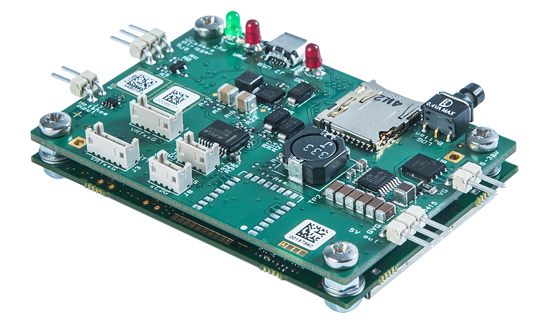Septentrio AsteRx UAS GPS Family¶
The Septentrio AsteRx-m2 UAS RTK GPS and other AsteRX-m RTK GPS are relatively expensive but also highly accurate RTK GPS receivers.

Note
Mission Planner GCS is the only GCS to support this feature currently.
Setup instructions¶
To setup this using GPS1 input (serial3) configure these parameters:
GPS_INJECT_TO = 0 (send to first GPS)
GPS1_RATE_MS = 100
GPS1_TYPE = 10 (SBF)
SERIAL3_BAUD = 115
SERIAL3_PROTOCOL = 5 (GPS)
To setup this using GPS2 input (serial4) configure these parameters:
GPS_INJECT_TO = 1 (send to 2nd GPS)
GPS2_RATE_MS = 100
GPS2_TYPE = 10 (SBF)
SERIAL4_BAUD = 115
SERIAL4_PROTOCOL = 5 (GPS)
The Septentrio driver currently does not use GPS_RATE_MS and GPS_RATE_MS2. It is still important to set them to the expected value of 100 (10Hz) as they are used as weights when combining GPS results.
If you want to inject RTCM corrections to both GPS1 and GPS2 then use:
GPS_INJECT_TO = 127 (send to all)
Note: Baud rate is auto-negotiated by the ArduPilot firmware, and might get set to something different than the 115200 baud.
GPS-for-Yaw¶
GPS-for-yaw is possible using two separate GPSs or, in ArduPilot 4.5 (or higher), a single unit with two antennas may also be used.
If a single unit with two antennas is used please set the following parameters:
GPS1_TYPE = 26 (SBF-DualAntenna)
GPS1_MB_TYPE = 1 (RelativeToCustomBase)
GPS1_MB_OFS_X, GPS1_MB_OFS_Y and GPS1_MB_OFS_Z to match the offset of the main antenna from the second in meters. For example if the second antenna is 50cm to the right of main antenna set GPS1_MB_OFS_Y = -0.5.
EK3_SRC1_YAW = 2 (GPS)
See the Antenna Offsets section for a diagram illustrating the directions of these offsets.
Note that the yaw calculation is only correct while the vehicle is upright, so it should not be used on vehicle that spend significant time at extreme lean angles (e.g tail sitters).